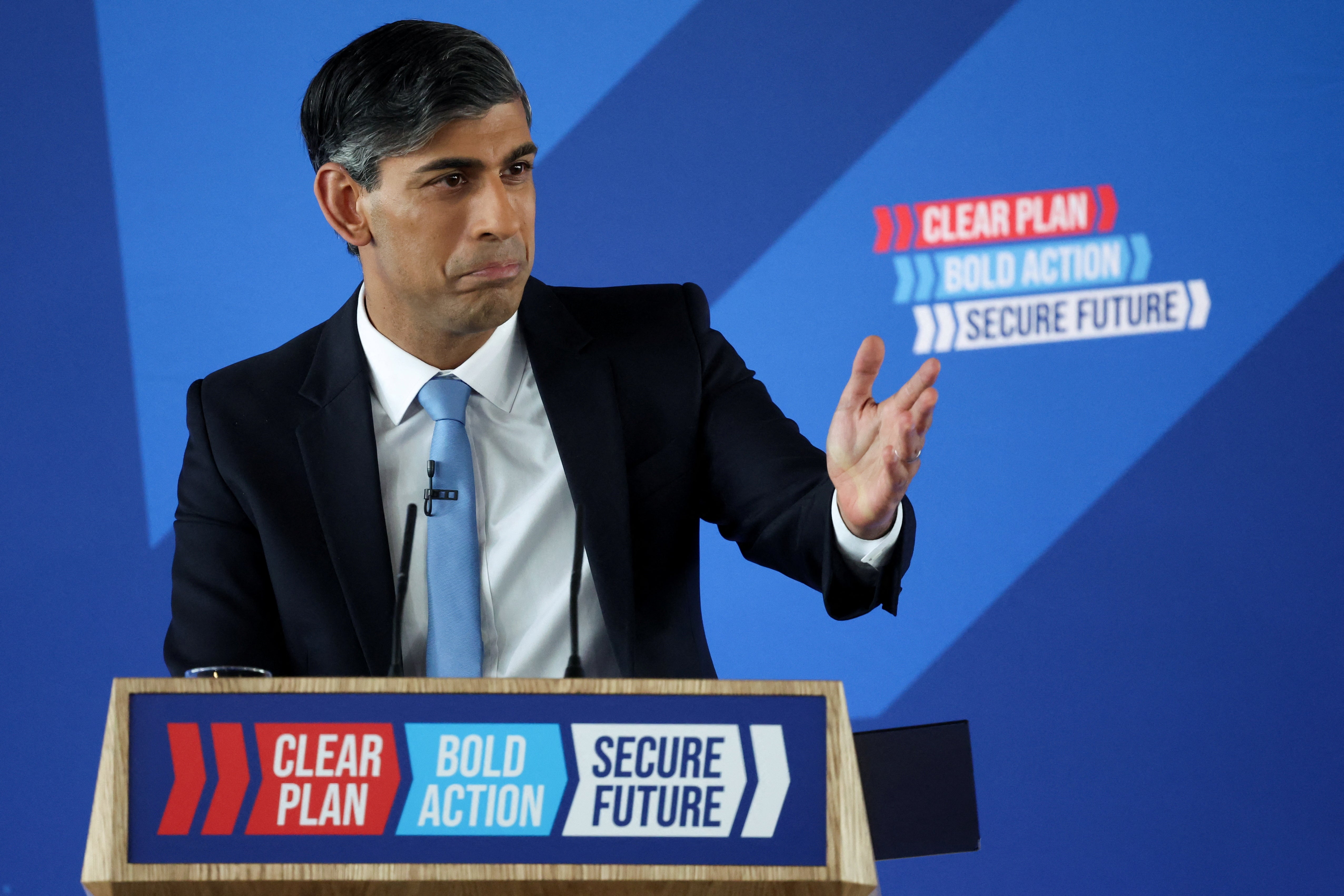With his ‘fairytale’ manifesto, Sunak has Trussed himself up
The Conservative Party’s blueprint for a fifth term in office relies heavily on unfunded tax cuts – exactly the sort of fiscal incoherence that got the prime minister’s predecessor into such trouble, says John Rentoul


It was sad to see Rishi Sunak, the responsible technocrat brought in to repair the damage done by Liz Truss’s “fairytale” economics, resort to her kind of policies.
The Conservative Party manifesto launched at Silverstone is a disjointed, unconvincing document born of desperation. It feels as if the press releases being issued by Tory HQ since the campaign began have been collated into a single document, with a couple of extra tax cuts thrown in.
Crucially, all the measures are paid for by the sort of imaginary funding sources that opposition parties turn to because they think they don’t have to make the numbers add up. A crackdown on tax avoidance and evasion, efficiencies in the civil service, and the big item: a £12bn-a-year cut in welfare spending.
This last pledge is to be achieved by “better targeting” disability benefits and tightening up “how the benefits system assesses capability for work”. It is pie in the sky – precisely the type of nonsense that Sunak so rightly criticised Truss for peddling in the Tory leadership campaign two years ago.
He is, in effect, proposing exactly the “fairytales” that she was selling: huge tax cuts, another 2p-in-the-pound cut in national insurance contributions by 2027, and the abolition of contributions altogether for the self-employed within five years, with no credible means of paying for them.
Keir Starmer was so delighted with the renewed signs of a flailing Tory campaign that, today, he forgot his message discipline. Labour politicians are supposed to mention Truss as often as possible, along with the phrase “crashed the economy”. But he reached for an analogy closer to home. “They are building a Jeremy Corbyn-style manifesto, where anything you want can go in it, none of it is costed,” he said. “Load everything into the wheelbarrow, don’t provide the funding, and hope that nobody notices the money isn’t there.”
It takes some brass neck for Starmer, who five years ago urged us to vote for the wheelbarrow manifesto, to hold it up as an object of ridicule now. But that is the opportunity that Sunak has handed him.
Sunak has Trussed himself up. He tried to restore trust by making five specific promises last year and invited us to judge him by them. He kept one of them – by presiding over falling inflation – but broke the other four (grow the economy, reduce debt, cut waiting lists and stop the boats). So the run-up to the election involved a series of increasingly desperate attempts to “turn the corner”.
Which is why the Tory campaign is so disconnected. Sunak claims to be cutting taxes while the tax burden is still rising, mainly because of the freezing of thresholds. He gave a carefully worded answer to the Daily Mail at the manifesto launch when he was asked if the tax burden would go down over the five years of an increasingly hypothetical Tory government: “The tax burden will be about one percentage point lower in every single year compared to the forecast that you saw in the spring Budget.” Which is a clever way of saying: “No.”
Sunak is trying to take credit for things that have gone down after they had gone up: NHS waiting lists, legal immigration and the numbers of Channel boats. And the number of people crossing the Channel, having gone down last year, is now going up again.
And he is trying to take the credit for other things that have gone down and then back up again, such as police numbers and school funding. He is defending a Tory record of 14 years in which the party has faced first one way then the other, so it is no wonder that he is struggling to construct a simple theme for his campaign.
But the problem of trust is fundamental. Truss broke it; he tried to mend it, but ended up overpromising – and now he has nothing left but to imitate his Tory arch-enemy. He was right the first time: unfunded tax cuts are a fraud on the British people.
“Liz, we have to be honest,” he said in 2022. “Borrowing your way out of inflation isn’t a plan.” It wasn’t a plan then, and it isn’t a plan now.






Join our commenting forum
Join thought-provoking conversations, follow other Independent readers and see their replies
0Comments